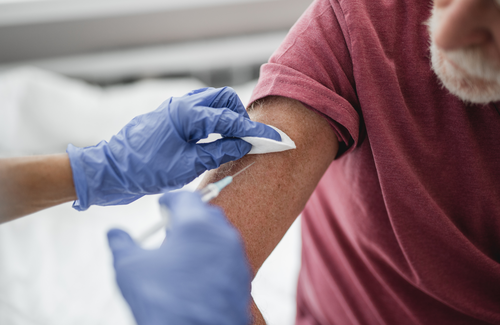
Additional and booster vaccine doses have been effective in preventing serious COVID-19 in people with HIV and others with immune dysfunction, a large study from the United States reported this week at the Conference on Retroviruses and Opportunistic Infections (CROI 2022).
The study also found that people with immune dysfunction who received an extra dose still had a reduced risk of SARS-CoV-2 infection at least nine months after being fully vaccinated.
Several studies have shown that people with HIV – especially those with CD4 counts below 200 – have weaker responses to the Pfizer and Moderna SARS-CoV-2 vaccines. Before the emergence of the Omicron variant in November 2021, health authorities in the United States and Europe had already recommended that people with HIV should receive an additional vaccine dose if they were immunocompromised. This dose is distinct from a booster dose and is intended to enable immune responses to vaccination to reach their full potential, rather than topping up waning responses.
Dr Jing Sun of Johns Hopkins Bloomberg School of Public Health, Baltimore, reported on breakthrough infections and severe COVID-19 cases in people who had received an additional or booster dose after full vaccination at 60 hospitals participating in the US National COVID Cohort Collaborative.
The study compared outcomes in people who were immunocompromised and fully vaccinated according to whether they had received a booster dose or not. However, the analysis didn’t distinguish between additional and booster doses, with both being referred to as boosters.
The study population consisted of people who had been fully vaccinated by 17 December 2021 and followed until 14 January 2022. Full vaccination was defined as two doses of the Pfizer or Moderna vaccine, or one dose of Johnson & Johnson. Overall, 614,750 people had been fully vaccinated. Of these, 174,042 had received a booster dose.
Twenty per cent had immune dysfunction. People were defined as immunocompromised if they were living with HIV, cancer, autoimmune disease or had undergone a solid organ or bone marrow transplant. The proportion of those with immune dysfunction who were living with HIV was not stated.
Booster recipients were significantly older (69 years vs 49 years) and significantly more had three or more co-morbidities (16% vs 12%). Booster recipients were more likely to be White and less likely to be Black or Hispanic than the fully vaccinated population as a whole. The median time from full vaccination to receipt of a booster dose was 7.4 months.
During the follow-up period, 48,893 of the fully vaccinated cohort became infected with SARS-CoV-2. Approximately 9000 infections in the fully vaccinated occurred after 19 December 2021, when the Omicron variant comprised more than half of all infections. But there was a high and steady rate of infections in the fully vaccinated from July 2021 onwards, as the Delta variant spread widely in the United States.
When the researchers looked at breakthrough infections in people without immunosuppression, they found that vaccine efficacy against breakthrough infection after a booster dose remained high seven months after full vaccination (77%) but fell to 52% by nine months after full vaccination.
But they also found that people who had received a booster jab remained at greatly reduced risk of a breakthrough infection. Less than five months after full vaccination, people who received a booster dose were 67% less likely to have become infected compared to people who were unboosted (hazard ratio 0.33, 95% confidence interval 0.22-0.52). The reduction in risk was little changed nine months after full vaccination (HR 0.45, 95% CI 0.40-0.51); people who received a booster were still 55% less likely to have experienced a breakthrough infection.
In immunocompromised people, booster vaccination also reduced the risk of breakthrough infection, although the reduction in the risk of infection was smaller. Nine months after full vaccination, boosted individuals had a 44% lower risk of breakthrough infection (HR 0.56, 95% CI 0.42-0.75) and the researchers calculated that the booster vaccine had an efficacy of 39% at this time-point.
Boosted individuals had a reduced risk of severe COVID-19 outcomes too. Receiving a booster dose reduced the risk of being admitted to hospital or dying of COVID-19 by over 85% in people without immune dysfunction and by approximately 80% in people with immune dysfunction. This analysis controlled for co-morbidities, demographics, region, prior infection and the timing of vaccination.
Dr Sun said that further analysis of the cohort is needed to look at the impact of CD4 count and viral suppression on booster response, although she emphasised that data regarding HIV-related factors are less complete.
Sun J et al. Covid-19 booster vaccine effectiveness in people with and without immune dysfunction. Conference on Retroviruses and Opportunistic Infections (CROI), abstract 48, 2022.

